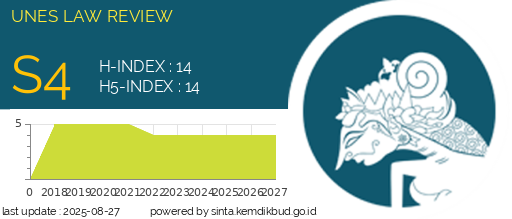Sistem Diversi Pada Tindak Pidana Narkotika oleh Anak yang Berkonflik dengan Hukum
DOI:
https://doi.org/10.31933/unesrev.v6i2.1300Keywords:
Children, Crime, Narcotics, Justice, DiversionAbstract
The crime of narcotics abuse in camping continues to grow, with trafficking involving children. The status of children who are vulnerable to unlawful acts means that the justice system must also consider the child's condition. Therefore, in the Indonesian justice system, the term 'juvenile criminal justice' is known, which is specifically applied to criminal acts committed by children. This also means that various criminal acts, such as narcotics crimes committed by children, must also be tried appropriately. As happened to the child defendant in decision no. 9/Pid.Sus-Anak/2022/Pn JKT.SEL. In this case study, children were involved as intermediaries in buying and selling narcotics. Based on this background, the aim of this research was to understand the criminal justice process in narcotics crimes against children, as well as the laws that can be used as a basis for justice applied to children. The research was carried out as a normative type of research, with a statutory and case study approach. The results of this research show that the administration of juvenile justice in Indonesia for narcotics crimes that make children suspects is carried out using a restorative justice approach with a diversion system. Even so, the judge still takes into account the demands of the prosecutor, and also the legal conditions that occurred. So that the judicial process can be relevant to the diversion that has been implemented. Meanwhile, the laws used as the basis for determining punishment consist of the Law on Narcotics, the Law on the Juvenile Criminal Justice System and the 1945 Constitution of the Republic of Indonesia concerning judicial power.
Downloads
References
Arief, B. N. (1994). Kebijakan Legislatif dalam Penanggulangan Kejahatan dengan Pidana Penjara. Semarang: Badan Penerbit Universitas Diponegoro.
Badu, L. W. (2022). Restoratif Justice In the Perspective of Customary Law: A Solution to the Settlement of Narcotics Crimes Commited by Children. Jambura Law Review 4 (2), 313-327.
E.Y. Kanter dan S.R. Sianturi. (2002). Asas-asas Hukum Pidana di Indonesia dan Penerapannya. Jakarta: Storia Grafika.
Gosita, A. (1989). Masalah Perlindungan Anak. Jakarta: Akademika Presindo.
Hakim, L. (2020). Asas-asas Hukum Pidana. Yogyakarta: CV Budi Utama.
Hamzah, A. (2008). Asas-asas Hukum Pidana. Jakarta: Rineka Cipta.
Mahmud, M. P. (2005). Penelitian Hukum. Jakarta: Prenada Media.
Moeljatno. (2008). Asas-asas Hukum Pidana, Cetakan ke-8. Jakarta: Rineka Cipta.
Muchsin. (2004). Kekuasaan Kehakiman yang Merdeka dan Kebijakan Asasi. Jakarta: STIH IBLAM.
Nafi, N. Y. (2023). Penegakan Hukum Terhadap Tindak Pidana Narkotika Oleh Anak (Studi Kasus Di Direktorat Reserse Narkoba Kepolisian Daerah Sulawesi Tengah). Tadulako Master Law Journal, 7 (1), 146-163.
Pandita, I. G. (2023). Analisis Yuridis Tindak Pidanapenyalahgunaan Narkotika Bagi Diri Sendiri Oleh Anak(Studi Putusan Nomor 1/Pid.Sus-Anak/2019/Pn Sgr). Jurnal Ilmu Hukum Sui Generis 3 (2), 101-116.
Prodjodikoro, W. (1981). Azas-Azas Hukum Pidana di Indonesia. Jakarta: Eresco.
Sunggono, B. (2016). Metodologi Penelitian Hukum. Jakarta: Raja Grafindo Persada.
Wedha, P. M. (2021). Kebijakan Pemidanaan Terhadap Anak Sebagai Penyalahguna Narkotika Golongan I Di Indonesia . Jurnal Kertha Negara 9 (5), 356-365.
Undang-Undang Republik Indonesia Nomor 35 Tahun 2009 Tentang Narkotika
Undang-Undang Republik Indonesia Nomor 11 Tahun 2012 Tentang Sistem Peradilan Pidana Anak
Downloads
Published
How to Cite
Issue
Section
License
Hak cipta :
Penulis yang mempublikasikan manuskripnya di jurnal ini menyetujui ketentuan berikut:
- Hak cipta pada setiap artikel adalah milik penulis.
- Penulis mengakui bahwa UNES Law Review berhak menjadi yang pertama menerbitkan dengan lisensi Creative Commons Attribution 4.0 International (Attribution 4.0 International CC BY 4.0) .
- Penulis dapat mengirimkan artikel secara terpisah, mengatur distribusi non-eksklusif manuskrip yang telah diterbitkan dalam jurnal ini ke versi lain (misalnya, dikirim ke repositori institusi penulis, publikasi ke dalam buku, dll.), dengan mengakui bahwa manuskrip telah diterbitkan pertama kali di Jurnal UNES Law Review.



















